外研版九年级英语上册课件 Module 1 Wonders of the world Unit 3 (共69张PPT)
文档属性
| 名称 | 外研版九年级英语上册课件 Module 1 Wonders of the world Unit 3 (共69张PPT) |  | |
| 格式 | ppt | ||
| 文件大小 | 17.2MB | ||
| 资源类型 | 教案 | ||
| 版本资源 | 外研版 | ||
| 科目 | 英语 | ||
| 更新时间 | 2022-08-04 15:25:01 | ||
图片预览

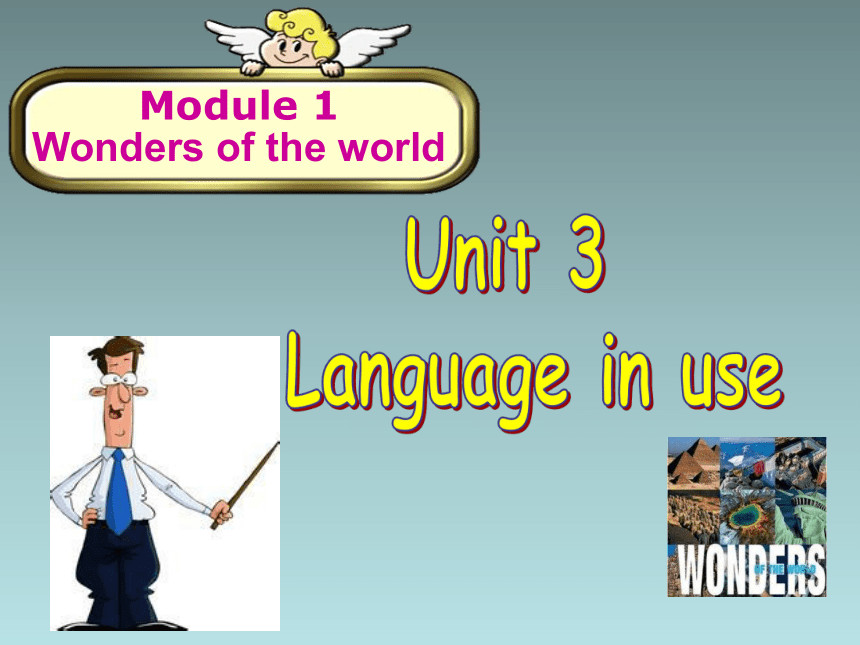
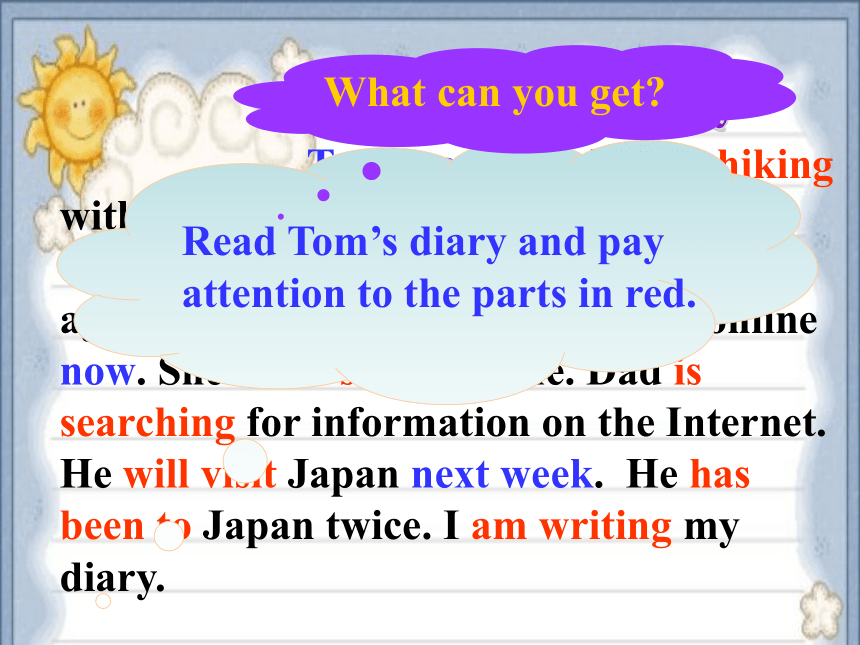
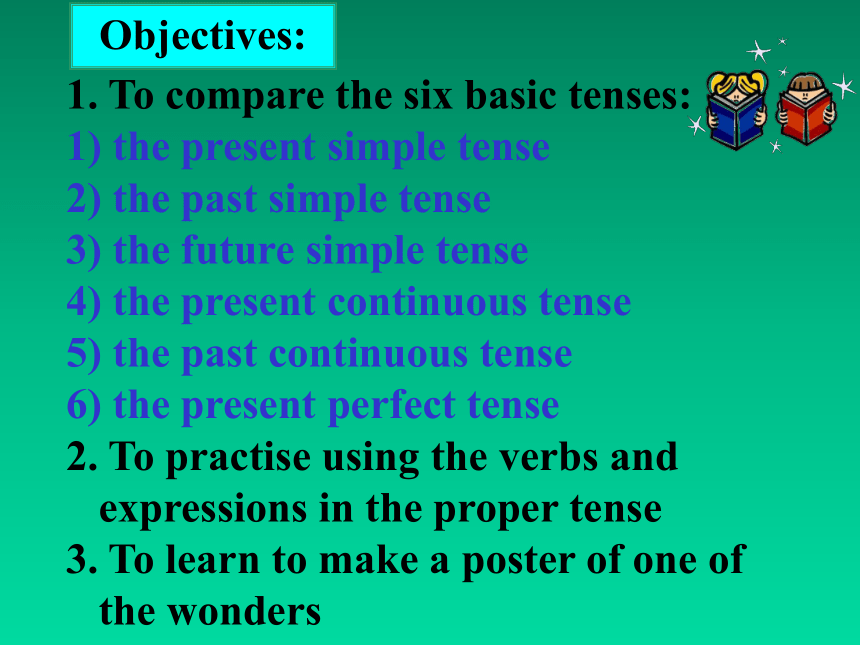
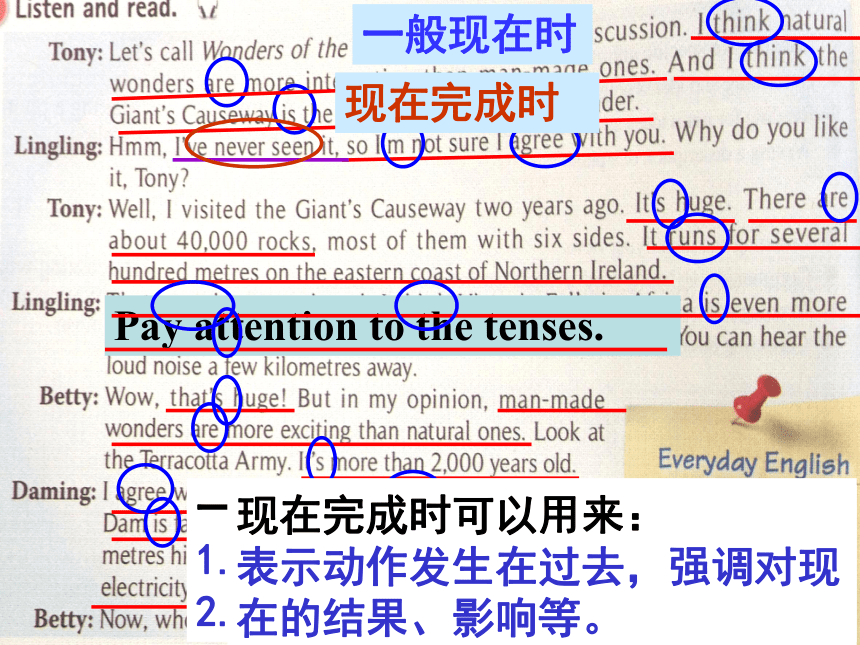
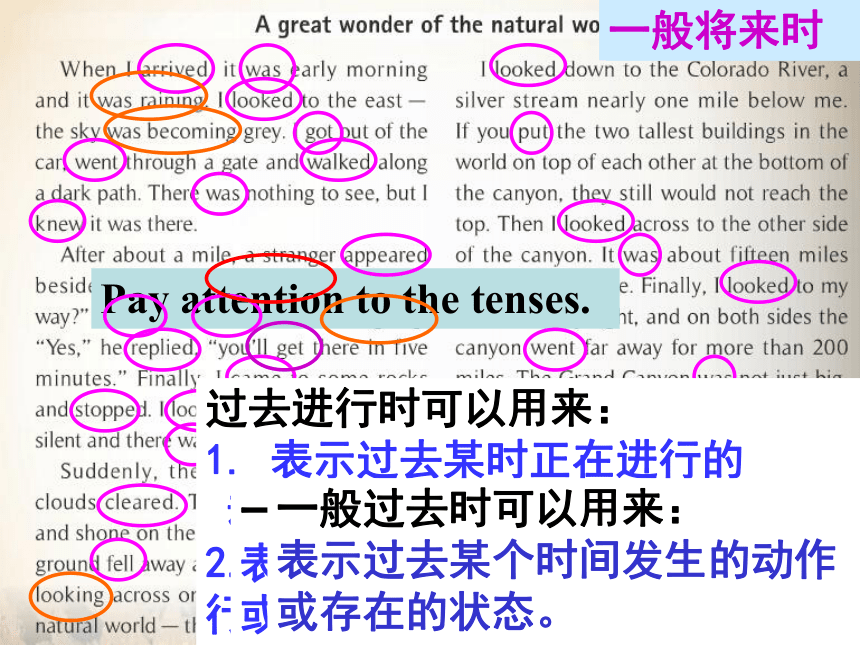
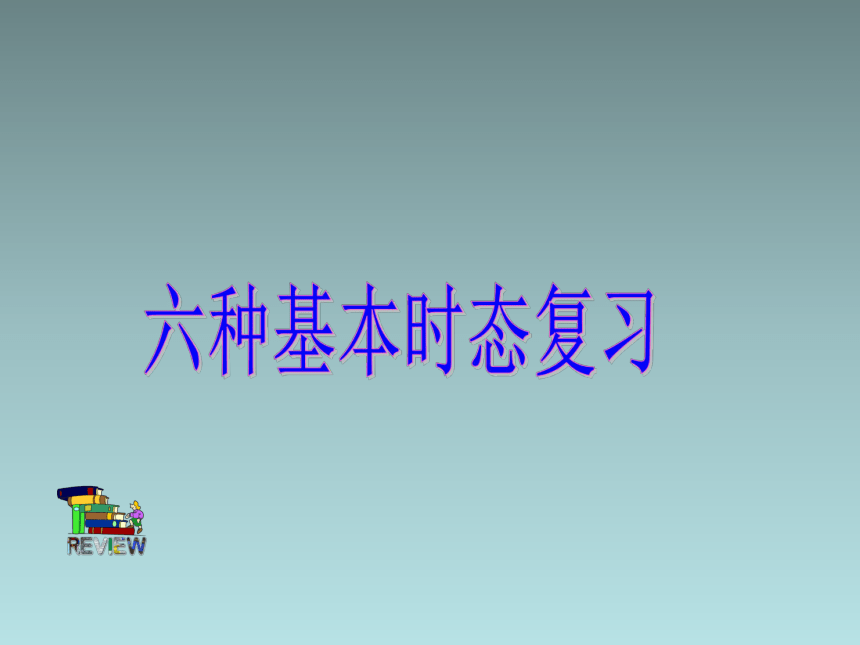
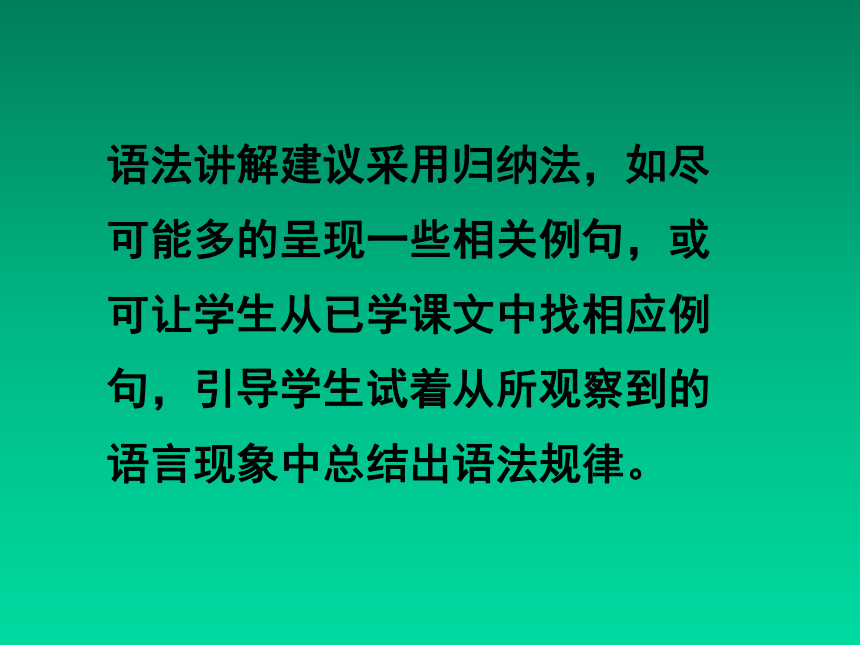
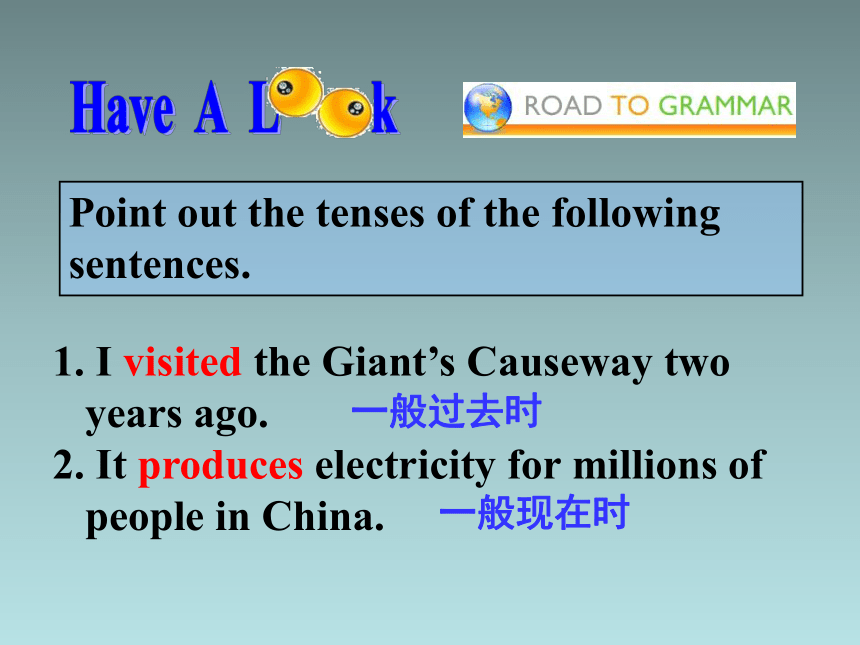
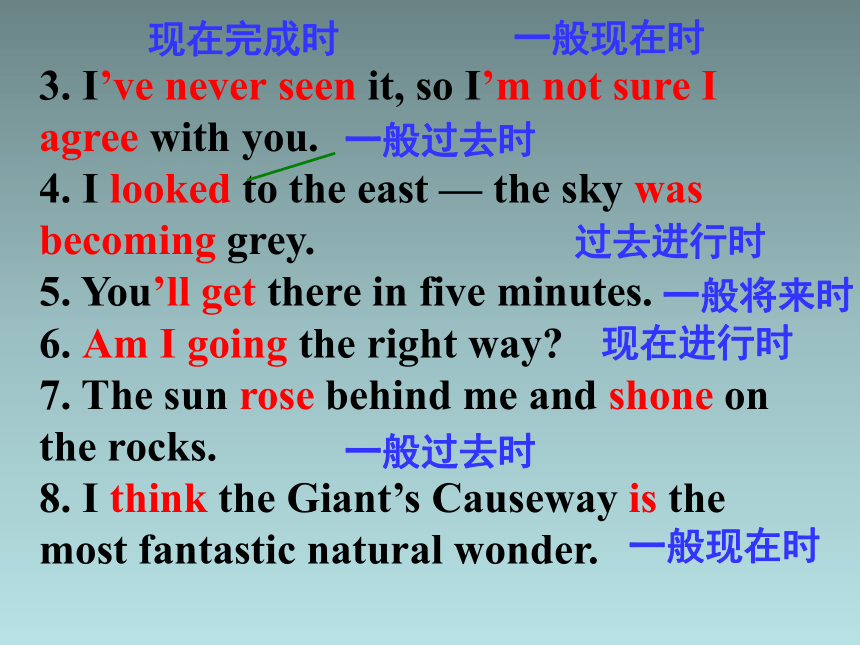
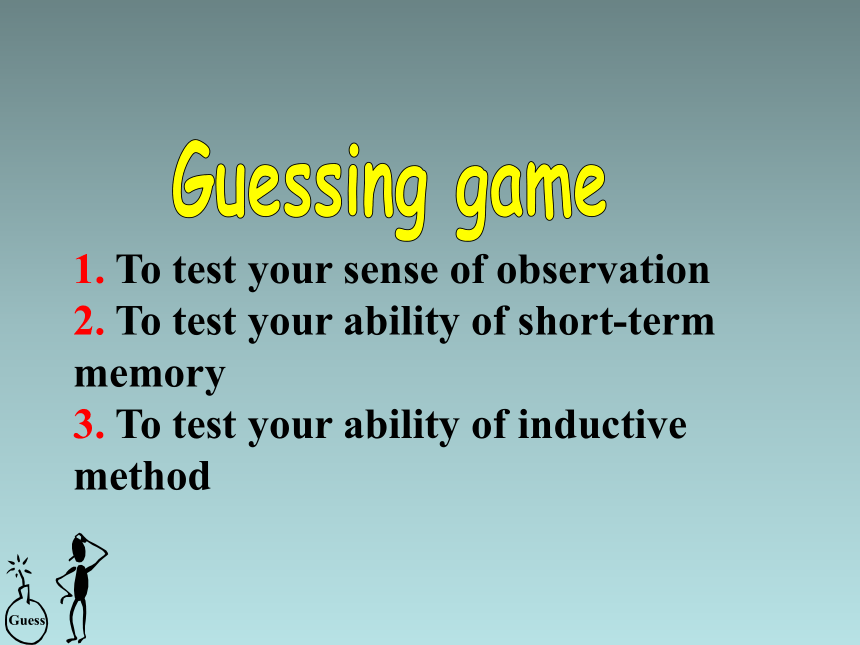
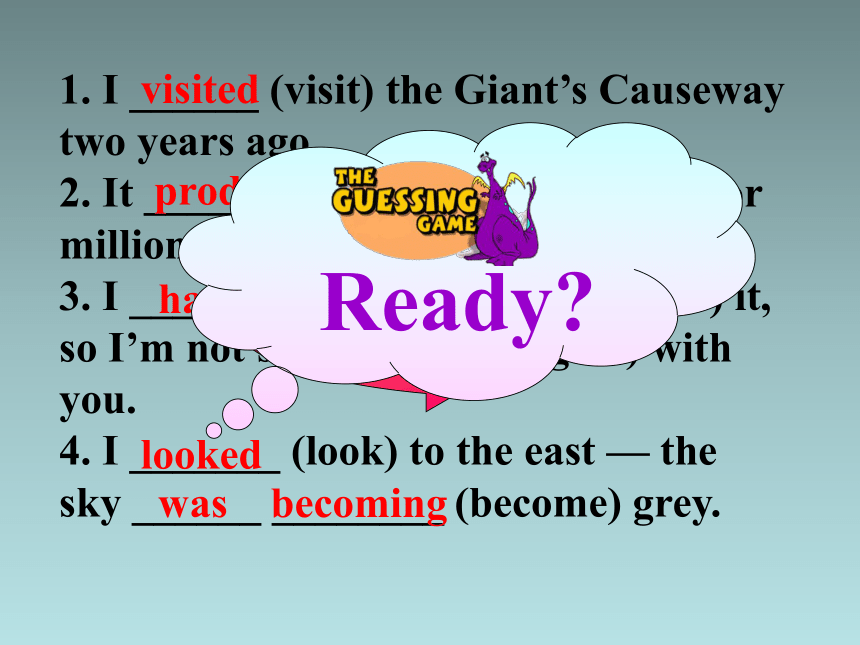
文档简介
(共69张PPT)
外研 九年级上
Module 1
Wonders of the world
不同时间和方式发生的动作或状态要用谓语动词的不同形式来表示,这种表示动作或状态发生时间和方式的动词形式称作动词时态。
Two years ago, I went hiking with my parents. It was a wonderful experience. Tomorrow I will go hiking again with them. Mum is shopping online now. She often shops online. Dad is searching for information on the Internet. He will visit Japan next week. He has been to Japan twice. I am writing my diary.
Read Tom’s diary and pay attention to the parts in red.
What can you get
Objectives:
1. To compare the six basic tenses:
the present simple tense
2) the past simple tense
3) the future simple tense
4) the present continuous tense
5) the past continuous tense
6) the present perfect tense
2. To practise using the verbs and expressions in the proper tense
3. To learn to make a poster of one of the wonders
Pay attention to the tenses.
一般现在时
一般现在时可以用来:
表述或说明某一事物的特性
描述现在的状况
现在完成时
现在完成时可以用来:
表示动作发生在过去,强调对现
在的结果、影响等。
Pay attention to the tenses.
一般过去时
现在进行时
现在进行时可以用来:
表示说话时正在进行的,目前
正在发生的动作。
过去进行时
过去进行时可以用来:
1. 表示过去某时正在进行的
动作或存在的状态
2. 表示在过去某段时间一直在进
行的动作
一般将来时
一般将来时可以用来:
表示将来某个时间要发生的动作
或存在的状态。
一般过去时可以用来:
表示过去某个时间发生的动作
或存在的状态。
语法讲解建议采用归纳法,如尽可能多的呈现一些相关例句,或可让学生从已学课文中找相应例句,引导学生试着从所观察到的语言现象中总结出语法规律。
Point out the tenses of the following
sentences.
1. I visited the Giant’s Causeway two years ago.
2. It produces electricity for millions of people in China.
一般过去时
一般现在时
3. I’ve never seen it, so I’m not sure I agree with you.
4. I looked to the east — the sky was becoming grey.
5. You’ll get there in five minutes.
6. Am I going the right way
7. The sun rose behind me and shone on the rocks.
8. I think the Giant’s Causeway is the most fantastic natural wonder.
现在完成时
一般现在时
现在进行时
一般过去时
一般现在时
一般过去时
过去进行时
一般将来时
1. To test your sense of observation
2. To test your ability of short-term memory
3. To test your ability of inductive method
Guess
1. I ______ (visit) the Giant’s Causeway two years ago.
2. It ________ (produce) electricity for millions of people in China.
3. I _____ ______ ______ (never see) it, so I’m not sure I ______ (agree) with you.
4. I _______ (look) to the east — the sky ______ ________ (become) grey.
visited
produces
have never seen
agree
was becoming
looked
go
Ready
5. You _____ _____ (get) there in five minutes.
6. _____ I ______ (go) the right way
7. The sun ______ (rise) behind me and _______ (shine) on the rocks.
8. I think the Giant’s Causeway _____ (be) the most fantastic natural wonder.
will get
Am going
rose
shone
is
动词的时态
到目前为止,我们已学过英语中常用的六种时态:
①一般现在时 ②一般过去时
③现在进行时 ④过去进行时
⑤一般将来时 ⑥现在完成时
该时态可以用来:
表述或说明某一事物的特性;
描述现在的状况;
描述经常发生的事情或真理。
I go to school at 6:30 every morning.
我每天早上六点半去上学。
The girl sings very well.
那个女孩唱得非常好。
The sun rises in the east and sets in the west.
太阳东升西落。
主语人称
第一人称单数
第三人称单数
第一、三人称复数
第二人称
be动词形式
am
is
are
I am a junior high school student.
Miss Li is our English teacher.
LiMing and WangLin are my classmates.
主语人称
第一人称单数
第三人称单数
第一、三人称复数
第二人称
实义动词形式
do (动词原形)
-s / es (第三人称单数)
do (动词原形)
We play basketball after school.
My uncle teaches at Sunshine Middle School.
I have a good friend.
1. 直接在动词后+s
like - likes play - plays
2. 以s, x, sh, ch接尾的动词:+es
wash-washes
3. 以辅音+o接尾的动词:+es
do - does go - goes
4. 以辅音+y接尾的动词:变y为i+es
fly-flies
实义动词第三人称单数的变化规则
实义动词一般现在时的否定句和疑问句构成要借助助动词do或does。
Students do not go to school on Sunday.
—Does your father go home at five in
the afternoon
—Yes, he does. / No, he doesn’t.
一般
过去时
构成
用法
常用
时间状语
V-ed
1. 表示过去某个时
间发生的动作或
存在的状态。
2.表示过去经常或
反复发生的动作。
yesterday
last night
in 1990
two days ago …
1. 一般在动词末尾加-ed,如:pull-pulled, cook-cooked
2. 结尾是e加d,如:taste-tasted
3. 末尾只有一个元音字母和一个辅音字母的重读闭音节,应双写末尾的辅音字母,再加-ed,如:stop-stopped
4. 以“辅音字母+y”结尾的,变y为i, 再加-ed,如:study-studied
5. 常用不规则V-ed:
am/is-was are-were
do-did see-saw say-said give-gave
get-got go-went come-came have-had
eat-ate take-took run-ran sing-sang
put-put make-made read-read
write-wrote draw-drew drink-drank
fly-flew ride-rode speak-spoke
sweep-swept swim-swam sit-sat
表示过去某个时间发生的动作或存在
的状态。
He said that here yesterday.
I got up at six thirty yesterday morning.
Did you have a good time last summer
2. 表示过去经常或反复发生的动作。
My father often went to work by
bus last year.
When I was a child, I often listened
to music.
一般过去时句式变化
肯定式 主语 + was / were + 其他. 主语 + V-ed + 其他.
否定式 was
主语 + not + 其他.
were 主语 + didn’t + 动词原形 + 其他.
一般疑
问句及
回答 Was / Were + 主语 + 其他
(肯) Yes, 主语 + was / were.
(否) No, 主语 + wasn’t /
weren’t. Did + 主语 + 动词
原形 + 其他
(肯) Yes, 主语 + did.
(否) No, 主语 +
didn’t.
yesterday
yesterday morning / afternoon / evening
last night / week / month / year …
two days / a week / three years ago …
in 1990 …
…
巧记动词过去时态
动词一般过去时,表示过去发生事;
be用was或用were,have, has变had;
谓语动词过去式,过去时间做标志;
一般动词加-ed,若是特殊得硬记;
否定句很简单,主语之后didn’t添;
疑问句也不难,did放在主语前;
谓语之前有did,谓语动词需还原;
动词若是was, were,否定就把not添。
现在进行时表示现在或现阶段正在进行或发生的动作。
① 肯定句: 主语 + am/is/are + V-ing
② 否定句: 主语 + am/is/are + not + V-ing
③ 疑问句: Am/Is/Are + 主语 + V-ing
① Look! The big bird is flying away.
_______________________________
②他现在正在看电影。
_______________________________
看,那只大鸟正在飞走。
He is watching a movie now.
表示说话时正在进行的,目前正在发生的动作。常带有表示目前时刻的时间副词, 如:now, at the (very) moment, for the time being, at present, 及Look! Listen! ...
2) 表示目前一段时间内正在进行,但
说话时可能没有进行的动作。
Right now I am studying Chinese by distance learning.
我现在正通过远程教育学习汉语。
3) 与always, constantly, forever, all the time等副词连用,表示动作反复或习惯。此时句子常含有说话者的强烈情感在内。表达较强的“责备”或“表扬”之意。
① You are always changing your mind.
你总是主意不定。(太烦人了。)
② He is always helping others.
他总是帮助别人。(他真是个好人。)
① He is leaving on Wednesday.
他将于周三离开。
② Mary isn’t here at the moment.
She is coming later.
玛丽现在不在这儿,她一会儿来。
4) 对于 come, go, leave, arrive, start 等
表示位置移动的动词常可用进行时
态表将来。
在过去某一时刻正在进行的动作
They were eating breakfast at 7:00 am
yesterday.
(b) I was writing a letter at this time
yesterday.
(c) Five minutes ago, Danny was looking
out of the window and Suzy was
reading a book.
过去进行时表示过去某时正在进行的
动作或存在的状态。
2. 在过去某段时间一直在进行的动作
(a) From 1983 to 1998, he was teaching
at Yale.
(b) They were building a dam last
winter.
(1) 基本结构:was / were + V-ing
(2) 否定式:was / were not + V-ing
was not = wasn’t were not = weren’t
I was doing some shopping.
I was not reading.
(3) 疑问句:Was / Were + 主语 + V-ing
回答:Yes, 主语 + was/were.
No, 主语 + was not/wasn’t.
were not/weren’t.
Was he running
Yes, he was. / No, he wasn’t.
【拓展】
现在进行时可以表示将来的动作,同样,过去进行时也可以表示从过去某时看来将要发生的动作。
Lucy arrived in Beijing last Friday, but she was leaving for Hong Kong the next
morning.
上周五露西到达北京,但第二天早晨就要动身去香港了。
一般将来时其构成形式通常有以下两种:
■ will / shall + 动词原形
(shall用于第一人称)
■ be going to + 动词原形
一般将来时表示将来某个时间要发生的动作或存在的状态。
Simple future tense with will and shall
主语 + will / shall + 动词原形……
主语 + will / shall not + 动词原形……
Will / Shall + 主语 + 动词原形……
Yes, 主语 + will / shall.
No, 主语 + will not (won’t) / shall not (shan’t).
结构:
用法:
表示动作在现在或目前还未发生,要在将来的某个时间内发生;它没有主观性,是“纯粹的将来动作”
eg: He will arrive here this evening .
注意:shall只用于第一人称,will 可用于第二、第三人称。
①表示说话人打算/意图将要干某事
He is going to spend his holidays in London .
②表示某种迹象表明将要发生……
It is going to rain soon.
Simple future tense with
be going to
主语 + be going to + 动词原形……
主语 + be not going to + 动词原形……
Be + 主语 + going to + 动词原形……
结构:
用法:
next Monday / Tuesday ...
next week / month / year …
the coming Sunday / Monday …
this afternoon / evening
tomorrow
the day after tomorrow
tonight
1. 表示动作到现在为止已经完成或刚刚完成。
I have finished my work.
We have set up many new factories.
2. 动作发生在过去,强调对现在的结果、
影响等。
Have you ever seen the film “Harry
Potter”
I’ve spent 3 years in the countryside.
3. 表示动作发生在过去,并且一直持续到现在,甚至还可能继续下去,句中使用持续性动词,且常有表示一段时间的时间状语。
We haven’t seen each other for ten years.
I’ve been an English teacher for about 20 years.
4. 现在完成时可以用在条件或时间状语从句中,表示将来某个时刻之前已经完成的动作。
I’ll go home as soon as I have finished my homework.
Please lend me that book if you have finished reading it.
肯定句:主语 + have / has + V-ed +
其他
否定句:主语 + haven’t / hasn’t + V-ed +
其他
一般疑问句:Have / Has + 主语 + V-ed +
…?
肯定答语:Yes, 主格代词 + have / has.
否定答语:No, 主格代词 + haven’t / hasn’t.
现在完成时表示某一已经完成的动作对现在造成的结果或影响,强调的是现在的情况,所以不能与表示过去的时间状语连用;一般过去时只表示某一动作或状态在过去发生或存在过, 与现在不发生联系,它可以与表示过去的时间状语连用。
He has read that book.
(说明他现在知道那本书的内容。)
He read that book last year.
(只说明他去年读过那本书。 )
He has gone to America.
(他现在不在此地, 到美国去了。)
He went to America.
(只说明他去过美国。)
以下部分为课本练习,供老师在对答案时选择使用。
Explain the differences in meaning between Sentences a) and b). (P 6)
1
1 a) I often play basketball.
b) I am playing basketball now.
2 a) She has gone to the Great Wall.
b) She has been to the Great Wall.
3 a) They had an English class yesterday.
b) They were having an English class
at nine o’clock yesterday morning.
现在经常做
现在正在做
去了某地
去过某地
过去某时间做过
过去某时间正在做
4 a) He is doing an interview.
b) He has done an interview.
5 a) We are drawing a picture of Victoria
Falls now.
b) We will draw a picture of Victoria
Falls.
现在正在做
现在已经做完
现在正在做
将要做
2
Complete the sentences with the correct form of the words in the box. (P 6)
appear finish give rain talk visit walk
1. Listen! It _________ outside.
2. The great musician _____________ a concert in Guangzhou next month.
3. Last summer, my parents _______ the Terracotta Army in Xi’an.
is raining
will give/is giving
visited
4. He ____ already ________ a new book about travel.
5. Thousands of people _____ along the Great Wall every year.
6. A few minutes later, a stranger ________ at the end of the street.
7. The students ___________ about the journey to the Grand Canyon when the teacher came into the classroom.
appear finish give rain talk visit walk
has finished
walk
appeared
were talking
Complete the passage with the correct form of the words in brackets. (P 7)
3
The sun was going down when we (1) _______ (arrive) at the ground floor of the building. I (2)____ (be) afraid of going to the top of tall buildings, so I was a little nervous when I (3)_______ (walk) into the lift. The lift (4)_______ (climb) faster and faster until we (5)________(reach) the 88th floor. It (6) ____ (be) high up there, but I was not afraid when I stood at the top.
arrived
was
walked
climbed
reached
was
The Jin Mao Tower in Shanghai, one of the tallest buildings in the world, (7) ___ (be) 420.5 metres high. It was built in 1999, and it (8) ____ (have) a fantastic view of Pudong District and the center of Shanghai. I really like the tower and I am sure I (9)________ (visit) it again.
is
has
will visit
4
Work in pairs. Talk about the wonders of the world you have or have not visited. (P 7)
A: Have you ever visited the Great Wall
B: Yes, I have./ No, I haven’t.
A: When did you visit it / When will
you visit it
B: I visited it five years ago. / Maybe I’ll
visit it next year.
Now complete the table.
Wonders of the world When did you visit it When will you visit it
The Great Wall
5
Complete the sentences with the correct form of the words in the box. There is one extra word. (P 7)
ancient high long natural opinion wonder
1. The Changjiang River is about 6,300 kilometres _________.
2. The Terracotta Army is a famous _______ wonder in China.
long
ancient
3. For my homework I have to write an article about the ________ of the world.
4. Mount Qomolangma is the _________ mountain in the world.
5. In my _________, the Great Wall is the greatest man-made wonder in the world.
ancient high long natural opinion wonder
wonders
highest
opinion
Complete the passage with the expressions in the box. (P 8)
6
I’m really (1) ________________ my visit to the Louvre Museum in Paris. It’s the most visited museum in the world — every year, (2) _________ people visit it. The Louvre is in an old building, but to get inside you must (3) ________ a giant glass pyramid that is (4) __________ 20 metres tall. The entrance to the museum is (5) _____________ the pyramid. Some people do not like the glass pyramid. They say it looks too new and does not suit the older building. I do not (6) _________ them. I think it looks great!
agree with at the bottom of go through looking forward to millions of more than
looking forward to
millions of
go through
agree with
at the bottom of
more than
7
Listen and number the pictures. (P 8)
a
b
c
3
1
2
8
Listen again and complete the table. (P 8)
Mount Qomolangma The Empire State Building The Great Pyramid at Giza
Location Between China and Nepal _________ In Egypt
Height _________ metres ________ metres About ______ metres now
Interesting facts First people to climb to the top: Sir Edmund Hillary and Tenzing Norgay _________ floors About ________ years old
8,844.43
in New York, the US
381
102
137
4,500
Work in pairs. Think about three other wonders of the world and talk about them. (P 9)
9
A: Where is…
B: It’s …
A: How high is it
B: It’s … metres high.
Work in groups of four. Make a poster about a wonder of the world. (P 9)
Decide on the wonder of the world for your poster.
Find out as much information as
you can in books or on websites.
Module task:
Making a poster of a wonder of the world
10
1. Why should people visit the wonder
2. What will people see there
3. How can people get there
4. How much does it cost to visit the wonder
5. When is the best time to visit the wonder
Make a poster. Find some pictures showing the wonder.
Present your poster to the class. (P 9)
11
时态 一般现在时 一般过去时 现在进行时 过去进行时 一般将来时 现在完成时
用法 表示经常性发生的动作、习惯性动作或客观真理、科学事实等。 表示过去某个时间发生的动作或存在的状态。 表示现在或现阶段正在进行或发生的动作。 表示过去某时正在进行的动作或存在的状态。 表示将来某个时间要发生的动作或存在的状态。 表示过去发生或者未发生的事对现在造成的影响或结果。
构成
方式 1. 动词be(am/is/are)
+ 表语…
2. 动词原形 + …
(主语是第三人称单数,动词也用第三人称单数) 1. 动词was/were
+ 表语
2. 实义动词的过
去式 + … be(am/is/are) + V-ing was / were +V-ing 1. will/shall + 动词原形
(shall 用于第一人称)
2. be going to + 动词原形 主语 + have / has + V-ed + …
句
型
变
化 疑
问
式 1. Be + 主语 + …
2. Do/Does + 主语 +
动词原形+ … 1. Was/Were + 主
语 + …
2. Did + 主语 +
动词原形 + … Be + 主语 + V-ing + … Was / Were + 主语 + V-ing + …? 1. Will/Shall + 主语 + 动词原形+ …
2. Be + 主语+ going to + 动词原形 + … Have / Has + 主语 + V-ed + …?
否
定
式 1. 主语 + be + not + …
2. 主语+don’t/doesn’t
+ 动词原形 + … 1. 主语 + was/were
+ not +…
2. 主语 + didn’t +
动词原形 + … 主语 + be + not
+ V-ing + … 主语 +
wasn’t (was not) / weren’t (were not) + V-ing + … 1. 主语 + will/shall not + 动词原形 + …
2. 主语 + be + not + going to + 动词原形 + … 主语 + haven’t / hasn’t + V-ed + …
Ⅰ. 用括号内所给动词的适当形式填空。
1. Mr Wang is our maths teacher and he _______ (go) home once a month.
2. Listen! Who ________ (cry) in the next room
3. Jane ____________ (water) the flowers in the garden at this time yesterday.
goes
is crying
was watering
Quiz
4. I _________ (use) this pen for a long time but it’s still good.
5. The Kings _______________________ (visit) a friend of theirs next week.
6. You _____still ________ (read)
a novel! But it’s time for the meeting.
7. They __________ (know) each other
since they were young boys.
have used
will visit/ are going to visit
have known
are reading
8. Liu Yang ____________(be) Hong Kong three times already.
9. —When Tom _____ (get) here, we will
finish the work.
—I’m afraid so.
10. —Where ____ your cousin ____ two
years ago, Lucy (work)
—In Changchun.
11. — ____ you ____ him anywhere before
—Yes, but I can’t remember where I
____ him. (meet)
has been to
gets
did
work
Have
met
met
中考小练
1. Mary with her parents often ______ (go) for a walk in the park after supper. (2015安顺)
2. --Mum, where is Dad
--He ____________ (plant) flowers in the garden now. (2015北京)
goes
is planting
Complete the following sentences with correct words.
3. --Will you see the film Cinderella with us tonight
--No, I _____(see) it last week. (2015长沙)
4. --John, I called you yesterday morning, but nobody answered the phone.
--Oh, I ______________(play) basketball at that time. (2015郴州)
saw
was playing
5. --Ben and Sue aren’t home, are they
--No. They __________(go) to London on business. (2015江西)
6. --Have you watched the new movie Jurassic world, Steven
--Not yet. I ___________(watch) it with my cousin this evening. (2015温州)
have gone
will watch
1. Finish the exercises in Learning English.
2. Preview Public holidays in Module 2.
Homework
外研 九年级上
Module 1
Wonders of the world
不同时间和方式发生的动作或状态要用谓语动词的不同形式来表示,这种表示动作或状态发生时间和方式的动词形式称作动词时态。
Two years ago, I went hiking with my parents. It was a wonderful experience. Tomorrow I will go hiking again with them. Mum is shopping online now. She often shops online. Dad is searching for information on the Internet. He will visit Japan next week. He has been to Japan twice. I am writing my diary.
Read Tom’s diary and pay attention to the parts in red.
What can you get
Objectives:
1. To compare the six basic tenses:
the present simple tense
2) the past simple tense
3) the future simple tense
4) the present continuous tense
5) the past continuous tense
6) the present perfect tense
2. To practise using the verbs and expressions in the proper tense
3. To learn to make a poster of one of the wonders
Pay attention to the tenses.
一般现在时
一般现在时可以用来:
表述或说明某一事物的特性
描述现在的状况
现在完成时
现在完成时可以用来:
表示动作发生在过去,强调对现
在的结果、影响等。
Pay attention to the tenses.
一般过去时
现在进行时
现在进行时可以用来:
表示说话时正在进行的,目前
正在发生的动作。
过去进行时
过去进行时可以用来:
1. 表示过去某时正在进行的
动作或存在的状态
2. 表示在过去某段时间一直在进
行的动作
一般将来时
一般将来时可以用来:
表示将来某个时间要发生的动作
或存在的状态。
一般过去时可以用来:
表示过去某个时间发生的动作
或存在的状态。
语法讲解建议采用归纳法,如尽可能多的呈现一些相关例句,或可让学生从已学课文中找相应例句,引导学生试着从所观察到的语言现象中总结出语法规律。
Point out the tenses of the following
sentences.
1. I visited the Giant’s Causeway two years ago.
2. It produces electricity for millions of people in China.
一般过去时
一般现在时
3. I’ve never seen it, so I’m not sure I agree with you.
4. I looked to the east — the sky was becoming grey.
5. You’ll get there in five minutes.
6. Am I going the right way
7. The sun rose behind me and shone on the rocks.
8. I think the Giant’s Causeway is the most fantastic natural wonder.
现在完成时
一般现在时
现在进行时
一般过去时
一般现在时
一般过去时
过去进行时
一般将来时
1. To test your sense of observation
2. To test your ability of short-term memory
3. To test your ability of inductive method
Guess
1. I ______ (visit) the Giant’s Causeway two years ago.
2. It ________ (produce) electricity for millions of people in China.
3. I _____ ______ ______ (never see) it, so I’m not sure I ______ (agree) with you.
4. I _______ (look) to the east — the sky ______ ________ (become) grey.
visited
produces
have never seen
agree
was becoming
looked
go
Ready
5. You _____ _____ (get) there in five minutes.
6. _____ I ______ (go) the right way
7. The sun ______ (rise) behind me and _______ (shine) on the rocks.
8. I think the Giant’s Causeway _____ (be) the most fantastic natural wonder.
will get
Am going
rose
shone
is
动词的时态
到目前为止,我们已学过英语中常用的六种时态:
①一般现在时 ②一般过去时
③现在进行时 ④过去进行时
⑤一般将来时 ⑥现在完成时
该时态可以用来:
表述或说明某一事物的特性;
描述现在的状况;
描述经常发生的事情或真理。
I go to school at 6:30 every morning.
我每天早上六点半去上学。
The girl sings very well.
那个女孩唱得非常好。
The sun rises in the east and sets in the west.
太阳东升西落。
主语人称
第一人称单数
第三人称单数
第一、三人称复数
第二人称
be动词形式
am
is
are
I am a junior high school student.
Miss Li is our English teacher.
LiMing and WangLin are my classmates.
主语人称
第一人称单数
第三人称单数
第一、三人称复数
第二人称
实义动词形式
do (动词原形)
-s / es (第三人称单数)
do (动词原形)
We play basketball after school.
My uncle teaches at Sunshine Middle School.
I have a good friend.
1. 直接在动词后+s
like - likes play - plays
2. 以s, x, sh, ch接尾的动词:+es
wash-washes
3. 以辅音+o接尾的动词:+es
do - does go - goes
4. 以辅音+y接尾的动词:变y为i+es
fly-flies
实义动词第三人称单数的变化规则
实义动词一般现在时的否定句和疑问句构成要借助助动词do或does。
Students do not go to school on Sunday.
—Does your father go home at five in
the afternoon
—Yes, he does. / No, he doesn’t.
一般
过去时
构成
用法
常用
时间状语
V-ed
1. 表示过去某个时
间发生的动作或
存在的状态。
2.表示过去经常或
反复发生的动作。
yesterday
last night
in 1990
two days ago …
1. 一般在动词末尾加-ed,如:pull-pulled, cook-cooked
2. 结尾是e加d,如:taste-tasted
3. 末尾只有一个元音字母和一个辅音字母的重读闭音节,应双写末尾的辅音字母,再加-ed,如:stop-stopped
4. 以“辅音字母+y”结尾的,变y为i, 再加-ed,如:study-studied
5. 常用不规则V-ed:
am/is-was are-were
do-did see-saw say-said give-gave
get-got go-went come-came have-had
eat-ate take-took run-ran sing-sang
put-put make-made read-read
write-wrote draw-drew drink-drank
fly-flew ride-rode speak-spoke
sweep-swept swim-swam sit-sat
表示过去某个时间发生的动作或存在
的状态。
He said that here yesterday.
I got up at six thirty yesterday morning.
Did you have a good time last summer
2. 表示过去经常或反复发生的动作。
My father often went to work by
bus last year.
When I was a child, I often listened
to music.
一般过去时句式变化
肯定式 主语 + was / were + 其他. 主语 + V-ed + 其他.
否定式 was
主语 + not + 其他.
were 主语 + didn’t + 动词原形 + 其他.
一般疑
问句及
回答 Was / Were + 主语 + 其他
(肯) Yes, 主语 + was / were.
(否) No, 主语 + wasn’t /
weren’t. Did + 主语 + 动词
原形 + 其他
(肯) Yes, 主语 + did.
(否) No, 主语 +
didn’t.
yesterday
yesterday morning / afternoon / evening
last night / week / month / year …
two days / a week / three years ago …
in 1990 …
…
巧记动词过去时态
动词一般过去时,表示过去发生事;
be用was或用were,have, has变had;
谓语动词过去式,过去时间做标志;
一般动词加-ed,若是特殊得硬记;
否定句很简单,主语之后didn’t添;
疑问句也不难,did放在主语前;
谓语之前有did,谓语动词需还原;
动词若是was, were,否定就把not添。
现在进行时表示现在或现阶段正在进行或发生的动作。
① 肯定句: 主语 + am/is/are + V-ing
② 否定句: 主语 + am/is/are + not + V-ing
③ 疑问句: Am/Is/Are + 主语 + V-ing
① Look! The big bird is flying away.
_______________________________
②他现在正在看电影。
_______________________________
看,那只大鸟正在飞走。
He is watching a movie now.
表示说话时正在进行的,目前正在发生的动作。常带有表示目前时刻的时间副词, 如:now, at the (very) moment, for the time being, at present, 及Look! Listen! ...
2) 表示目前一段时间内正在进行,但
说话时可能没有进行的动作。
Right now I am studying Chinese by distance learning.
我现在正通过远程教育学习汉语。
3) 与always, constantly, forever, all the time等副词连用,表示动作反复或习惯。此时句子常含有说话者的强烈情感在内。表达较强的“责备”或“表扬”之意。
① You are always changing your mind.
你总是主意不定。(太烦人了。)
② He is always helping others.
他总是帮助别人。(他真是个好人。)
① He is leaving on Wednesday.
他将于周三离开。
② Mary isn’t here at the moment.
She is coming later.
玛丽现在不在这儿,她一会儿来。
4) 对于 come, go, leave, arrive, start 等
表示位置移动的动词常可用进行时
态表将来。
在过去某一时刻正在进行的动作
They were eating breakfast at 7:00 am
yesterday.
(b) I was writing a letter at this time
yesterday.
(c) Five minutes ago, Danny was looking
out of the window and Suzy was
reading a book.
过去进行时表示过去某时正在进行的
动作或存在的状态。
2. 在过去某段时间一直在进行的动作
(a) From 1983 to 1998, he was teaching
at Yale.
(b) They were building a dam last
winter.
(1) 基本结构:was / were + V-ing
(2) 否定式:was / were not + V-ing
was not = wasn’t were not = weren’t
I was doing some shopping.
I was not reading.
(3) 疑问句:Was / Were + 主语 + V-ing
回答:Yes, 主语 + was/were.
No, 主语 + was not/wasn’t.
were not/weren’t.
Was he running
Yes, he was. / No, he wasn’t.
【拓展】
现在进行时可以表示将来的动作,同样,过去进行时也可以表示从过去某时看来将要发生的动作。
Lucy arrived in Beijing last Friday, but she was leaving for Hong Kong the next
morning.
上周五露西到达北京,但第二天早晨就要动身去香港了。
一般将来时其构成形式通常有以下两种:
■ will / shall + 动词原形
(shall用于第一人称)
■ be going to + 动词原形
一般将来时表示将来某个时间要发生的动作或存在的状态。
Simple future tense with will and shall
主语 + will / shall + 动词原形……
主语 + will / shall not + 动词原形……
Will / Shall + 主语 + 动词原形……
Yes, 主语 + will / shall.
No, 主语 + will not (won’t) / shall not (shan’t).
结构:
用法:
表示动作在现在或目前还未发生,要在将来的某个时间内发生;它没有主观性,是“纯粹的将来动作”
eg: He will arrive here this evening .
注意:shall只用于第一人称,will 可用于第二、第三人称。
①表示说话人打算/意图将要干某事
He is going to spend his holidays in London .
②表示某种迹象表明将要发生……
It is going to rain soon.
Simple future tense with
be going to
主语 + be going to + 动词原形……
主语 + be not going to + 动词原形……
Be + 主语 + going to + 动词原形……
结构:
用法:
next Monday / Tuesday ...
next week / month / year …
the coming Sunday / Monday …
this afternoon / evening
tomorrow
the day after tomorrow
tonight
1. 表示动作到现在为止已经完成或刚刚完成。
I have finished my work.
We have set up many new factories.
2. 动作发生在过去,强调对现在的结果、
影响等。
Have you ever seen the film “Harry
Potter”
I’ve spent 3 years in the countryside.
3. 表示动作发生在过去,并且一直持续到现在,甚至还可能继续下去,句中使用持续性动词,且常有表示一段时间的时间状语。
We haven’t seen each other for ten years.
I’ve been an English teacher for about 20 years.
4. 现在完成时可以用在条件或时间状语从句中,表示将来某个时刻之前已经完成的动作。
I’ll go home as soon as I have finished my homework.
Please lend me that book if you have finished reading it.
肯定句:主语 + have / has + V-ed +
其他
否定句:主语 + haven’t / hasn’t + V-ed +
其他
一般疑问句:Have / Has + 主语 + V-ed +
…?
肯定答语:Yes, 主格代词 + have / has.
否定答语:No, 主格代词 + haven’t / hasn’t.
现在完成时表示某一已经完成的动作对现在造成的结果或影响,强调的是现在的情况,所以不能与表示过去的时间状语连用;一般过去时只表示某一动作或状态在过去发生或存在过, 与现在不发生联系,它可以与表示过去的时间状语连用。
He has read that book.
(说明他现在知道那本书的内容。)
He read that book last year.
(只说明他去年读过那本书。 )
He has gone to America.
(他现在不在此地, 到美国去了。)
He went to America.
(只说明他去过美国。)
以下部分为课本练习,供老师在对答案时选择使用。
Explain the differences in meaning between Sentences a) and b). (P 6)
1
1 a) I often play basketball.
b) I am playing basketball now.
2 a) She has gone to the Great Wall.
b) She has been to the Great Wall.
3 a) They had an English class yesterday.
b) They were having an English class
at nine o’clock yesterday morning.
现在经常做
现在正在做
去了某地
去过某地
过去某时间做过
过去某时间正在做
4 a) He is doing an interview.
b) He has done an interview.
5 a) We are drawing a picture of Victoria
Falls now.
b) We will draw a picture of Victoria
Falls.
现在正在做
现在已经做完
现在正在做
将要做
2
Complete the sentences with the correct form of the words in the box. (P 6)
appear finish give rain talk visit walk
1. Listen! It _________ outside.
2. The great musician _____________ a concert in Guangzhou next month.
3. Last summer, my parents _______ the Terracotta Army in Xi’an.
is raining
will give/is giving
visited
4. He ____ already ________ a new book about travel.
5. Thousands of people _____ along the Great Wall every year.
6. A few minutes later, a stranger ________ at the end of the street.
7. The students ___________ about the journey to the Grand Canyon when the teacher came into the classroom.
appear finish give rain talk visit walk
has finished
walk
appeared
were talking
Complete the passage with the correct form of the words in brackets. (P 7)
3
The sun was going down when we (1) _______ (arrive) at the ground floor of the building. I (2)____ (be) afraid of going to the top of tall buildings, so I was a little nervous when I (3)_______ (walk) into the lift. The lift (4)_______ (climb) faster and faster until we (5)________(reach) the 88th floor. It (6) ____ (be) high up there, but I was not afraid when I stood at the top.
arrived
was
walked
climbed
reached
was
The Jin Mao Tower in Shanghai, one of the tallest buildings in the world, (7) ___ (be) 420.5 metres high. It was built in 1999, and it (8) ____ (have) a fantastic view of Pudong District and the center of Shanghai. I really like the tower and I am sure I (9)________ (visit) it again.
is
has
will visit
4
Work in pairs. Talk about the wonders of the world you have or have not visited. (P 7)
A: Have you ever visited the Great Wall
B: Yes, I have./ No, I haven’t.
A: When did you visit it / When will
you visit it
B: I visited it five years ago. / Maybe I’ll
visit it next year.
Now complete the table.
Wonders of the world When did you visit it When will you visit it
The Great Wall
5
Complete the sentences with the correct form of the words in the box. There is one extra word. (P 7)
ancient high long natural opinion wonder
1. The Changjiang River is about 6,300 kilometres _________.
2. The Terracotta Army is a famous _______ wonder in China.
long
ancient
3. For my homework I have to write an article about the ________ of the world.
4. Mount Qomolangma is the _________ mountain in the world.
5. In my _________, the Great Wall is the greatest man-made wonder in the world.
ancient high long natural opinion wonder
wonders
highest
opinion
Complete the passage with the expressions in the box. (P 8)
6
I’m really (1) ________________ my visit to the Louvre Museum in Paris. It’s the most visited museum in the world — every year, (2) _________ people visit it. The Louvre is in an old building, but to get inside you must (3) ________ a giant glass pyramid that is (4) __________ 20 metres tall. The entrance to the museum is (5) _____________ the pyramid. Some people do not like the glass pyramid. They say it looks too new and does not suit the older building. I do not (6) _________ them. I think it looks great!
agree with at the bottom of go through looking forward to millions of more than
looking forward to
millions of
go through
agree with
at the bottom of
more than
7
Listen and number the pictures. (P 8)
a
b
c
3
1
2
8
Listen again and complete the table. (P 8)
Mount Qomolangma The Empire State Building The Great Pyramid at Giza
Location Between China and Nepal _________ In Egypt
Height _________ metres ________ metres About ______ metres now
Interesting facts First people to climb to the top: Sir Edmund Hillary and Tenzing Norgay _________ floors About ________ years old
8,844.43
in New York, the US
381
102
137
4,500
Work in pairs. Think about three other wonders of the world and talk about them. (P 9)
9
A: Where is…
B: It’s …
A: How high is it
B: It’s … metres high.
Work in groups of four. Make a poster about a wonder of the world. (P 9)
Decide on the wonder of the world for your poster.
Find out as much information as
you can in books or on websites.
Module task:
Making a poster of a wonder of the world
10
1. Why should people visit the wonder
2. What will people see there
3. How can people get there
4. How much does it cost to visit the wonder
5. When is the best time to visit the wonder
Make a poster. Find some pictures showing the wonder.
Present your poster to the class. (P 9)
11
时态 一般现在时 一般过去时 现在进行时 过去进行时 一般将来时 现在完成时
用法 表示经常性发生的动作、习惯性动作或客观真理、科学事实等。 表示过去某个时间发生的动作或存在的状态。 表示现在或现阶段正在进行或发生的动作。 表示过去某时正在进行的动作或存在的状态。 表示将来某个时间要发生的动作或存在的状态。 表示过去发生或者未发生的事对现在造成的影响或结果。
构成
方式 1. 动词be(am/is/are)
+ 表语…
2. 动词原形 + …
(主语是第三人称单数,动词也用第三人称单数) 1. 动词was/were
+ 表语
2. 实义动词的过
去式 + … be(am/is/are) + V-ing was / were +V-ing 1. will/shall + 动词原形
(shall 用于第一人称)
2. be going to + 动词原形 主语 + have / has + V-ed + …
句
型
变
化 疑
问
式 1. Be + 主语 + …
2. Do/Does + 主语 +
动词原形+ … 1. Was/Were + 主
语 + …
2. Did + 主语 +
动词原形 + … Be + 主语 + V-ing + … Was / Were + 主语 + V-ing + …? 1. Will/Shall + 主语 + 动词原形+ …
2. Be + 主语+ going to + 动词原形 + … Have / Has + 主语 + V-ed + …?
否
定
式 1. 主语 + be + not + …
2. 主语+don’t/doesn’t
+ 动词原形 + … 1. 主语 + was/were
+ not +…
2. 主语 + didn’t +
动词原形 + … 主语 + be + not
+ V-ing + … 主语 +
wasn’t (was not) / weren’t (were not) + V-ing + … 1. 主语 + will/shall not + 动词原形 + …
2. 主语 + be + not + going to + 动词原形 + … 主语 + haven’t / hasn’t + V-ed + …
Ⅰ. 用括号内所给动词的适当形式填空。
1. Mr Wang is our maths teacher and he _______ (go) home once a month.
2. Listen! Who ________ (cry) in the next room
3. Jane ____________ (water) the flowers in the garden at this time yesterday.
goes
is crying
was watering
Quiz
4. I _________ (use) this pen for a long time but it’s still good.
5. The Kings _______________________ (visit) a friend of theirs next week.
6. You _____still ________ (read)
a novel! But it’s time for the meeting.
7. They __________ (know) each other
since they were young boys.
have used
will visit/ are going to visit
have known
are reading
8. Liu Yang ____________(be) Hong Kong three times already.
9. —When Tom _____ (get) here, we will
finish the work.
—I’m afraid so.
10. —Where ____ your cousin ____ two
years ago, Lucy (work)
—In Changchun.
11. — ____ you ____ him anywhere before
—Yes, but I can’t remember where I
____ him. (meet)
has been to
gets
did
work
Have
met
met
中考小练
1. Mary with her parents often ______ (go) for a walk in the park after supper. (2015安顺)
2. --Mum, where is Dad
--He ____________ (plant) flowers in the garden now. (2015北京)
goes
is planting
Complete the following sentences with correct words.
3. --Will you see the film Cinderella with us tonight
--No, I _____(see) it last week. (2015长沙)
4. --John, I called you yesterday morning, but nobody answered the phone.
--Oh, I ______________(play) basketball at that time. (2015郴州)
saw
was playing
5. --Ben and Sue aren’t home, are they
--No. They __________(go) to London on business. (2015江西)
6. --Have you watched the new movie Jurassic world, Steven
--Not yet. I ___________(watch) it with my cousin this evening. (2015温州)
have gone
will watch
1. Finish the exercises in Learning English.
2. Preview Public holidays in Module 2.
Homework
同课章节目录
- Module 1 Wonders of the world
- Unit 1 It's more than 2,000 years old.
- Unit 2 The Grand Canyon was not just big.
- Unit 3 Language in use
- Module 2 Public holidays
- Unit 1 My family always go somewhere interesting a
- Unit 2 We have celebrated the festival since the f
- Unit 3 Language in use
- Module 3 Heroes
- Unit 1 She trained hard,so she became a great play
- Unit 2There were few doctors, so he had to work ve
- Unit 3 Language in use
- Module 4 Home alone
- Unit 1 I can look after myself, although it won’t
- Unit 2 I became so bored with their orders that I
- Unit 3 Language in use
- Module 5 Museums
- Unit 1 Don't cross that rope!
- Unit 2 If you ever go to London, make sure you vis
- Unit 3 Language in use
- Module 6 Problems
- Unit 1 If I start after dinner, I'll finish it be
- Unit 2 If you tell him the truth now, you will sho
- Unit 3 Language in use
- Revision Module A
- Module 7 Great books
- Unit 1 We're still influenced by Confucius's idea
- Unit 2 It is still read and loved.
- Unit 3 Language in use
- Module 8 Sports life
- Unit 1 Daming wasn't chosen for the team last time
- Unit 2 He was invited to competitions around the w
- Unit 3 Language in use
- Module 9 Great inventions
- Unit 1 Will computers be used more than books in t
- Unit 2 Will books be replaced by the Internet?
- Unit 3 Language in use
- Module 10 Australia
- Unit 1 I have some photos that I took in Australia
- Unit 2 The game that they like most is Australian
- Unit 3 Language in use
- Module 11 Photos
- Unit 1 He's the boy who won the photo competition
- Unit 2 The photo which we liked best was taken by
- Unit 3 Language in use
- Module 12 Save our world
- Unit 1 If everyone starts to do something, the wor
- Unit 2 Repeat these three words daily: reduce, reu
- Unit 3 Language in use
- Revision Module B
